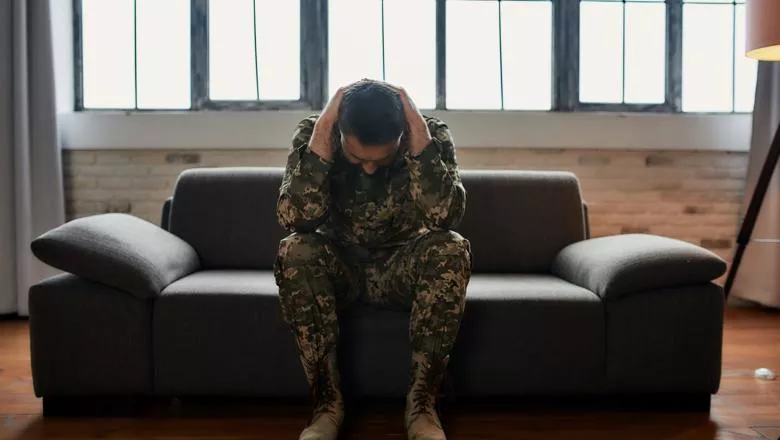
Dr Sharon Stevelink
Reader in Epidemiology
Research interests
- Mental Health
- Psychiatry
Contact details
Biography
Dr Sharon Stevelink is a Reader in Epidemiology at the Institute of Psychiatry, Psychology & Neuroscience at King’s College London. She formally trained in Epidemiology at the London School of Hygiene and Tropical Medicine. Sharon joined King’s College London in September 2012. Over the years, she has built up a comprehensive research portfolio exploring work and mental health.
She is the Co-Principal Investigator on a landmark study exploring the impact of deployment on the mental health and wellbeing of UK military personnel and veterans that has been running for nearly two decades.
In addition, she co-leads a longitudinal study exploring the impact of the COVID-19 pandemic on the mental health and wellbeing outcomes of over 25,000 healthcare workers (NHS CHECK). Other studies that Sharon leads include an exploration of transition among female veterans (SUSTAIN) and a study that investigates the mental health and physical health needs of veterans accessing primary care (CPRD).
Currently, Sharon holds a NIHR Advanced Fellowship exploring the impact of the welfare system on mental health service users, capitalising upon a first ever data linkage of administrative benefits records with electronic mental health records in the UK. In 2023, she was appointed by the Government as a scientific member of the Industrial Injuries Advisory Council.
She also holds a UKRI/ESRC Policy Fellowship and is currently part-time seconded to the Office of the Chief Social Policy Adviser, Scottish Government where she leads a project concerning trends and drivers of poverty with a focus on rural and island communities in Scotland.
Sharon has led or been involved in various studies that have now finished. For example, she led the ENABLE study that explored the risk for progression from one long-term health condition to several, with a focus on socio-demographic, socioeconomic, psychosocial and health factors, thereby also exploring which long-term health conditions were most likely to lead to loss of work. Data from the South East London Community Health study were used to explore these research questions.
Further, Sharon co-led the TRIAD study, a longitudinal study focusing on how PTSD develops in UK Armed Forces personnel. This study capitalised on the health and wellbeing cohort study that has been run successfully by KCMHR over the last 20 years.
She also led on the secondary data analysis of the Airwave study, thereby exploring mental health outcomes among over 40,000 police officers and staff and a study comparing mental health outcomes among emergency responders using data from the UK Biobank.
In addition, she set up the KCL CHECK study, a longitudinal study that explored the impact of the COVID-19 pandemic on the King’s College London community, thereby also providing regular antibody testing to KCL staff and postgraduate research students who participated.
Sharon supervises various PhD and DClin Psychology students in the area of work, mental health and welfare. She would be interested to supervise students who are interested in using longitudinal survey data, data linkage, administrative and healthcare record data to address questions that overlap with her research interests.
Education and training
- 2019 Fellow, UK Higher Education Academy
- 2019 Postgraduate Certificate in Academic Practice in Higher Education
- 2012 MSc Epidemiology, London School of Hygiene & Tropical Medicine
- 2011 PhD Measuring health-related stigma in low-resource settings, VU University Amsterdam
- 2011 MSc in Management, Policy-Analysis and Entrepreneurship in Health and Life Sciences (specialisation International Public Health), VU University Amsterdam
- 2008 BSc Health Sciences, VU University Amsterdam
Research interests
- Work and health
- Occupational mental health
- Military health
- Epidemiology
- Psychiatry
- Emergency responders
- Welfare system
- Data linkage
Teaching
- Research methods and statistics for the MSc in Psychiatric Research, IoPPN, KCL
Expertise and public engagement
Sharon started the Veteran Research Advisory Group for the King’s Centre for Military Health Research that brings together veterans to help shape and inform the research agenda of the Centre. As part of her NIHR Fellowship, she has embedded three members of the public in her research team who have lived experience of the welfare system and mental health services.
She often works with stakeholders in the field such as the Department for Work and Pensions, Office for Veterans’ Affairs, Ministry of Defence, NHS England, local government, third sector organisations and charities.
Research
Health and Wellbeing Cohort Study
A long-term study investigating the health and wellbeing of UK military personnel deployed to Iraq and Afghanistan.
Project status: Ongoing

King’s Centre for Military Health Research (KCMHR)
The King’s Centre for Military Health Research (KCMHR), King’s College London, is the leading civilian UK centre of excellence for military health research.
News
New £7M research investment to investigate population-based improvement of mental health
£7 million funding from UK Research and Innovation, has been awarded to lead partner King’s College London to establish a research theme in Population Mental...

Healthcare workers in England experience PTSD at twice the rate of the general public
New research led by the Institute of Psychiatry, Psychology & Neuroscience (IoPPN) at King’s College London in collaboration with the NIHR ARC North Thames at...

Armed Forces Personnel who are injured in combat at greater risk of poor mental health
Members of the British Armed Forces who were physically injured while fighting in Afghanistan are more likely to experience poor mental health compared to...

PTSD and harmful drinking in the UK Armed Forces and UK Police Service
A new paper from King’s College London and the University of Liverpool, comparing post-traumatic stress disorder (PTSD) and harmful drinking in male members...

More support needed for Armed Forces personnel with PTSD
A major new study has been published today exploring how PTSD (Post-Traumatic Stress Disorder) affects UK Armed Forces personnel - particularly those who...

Features
Mental health, welfare and state support: the potential of combining different datasets
In this blog Dr Sharon Stevelink ooks at the potential for linking data sets to understand the impact of the benefits system on mental health and work.

Research
Health and Wellbeing Cohort Study
A long-term study investigating the health and wellbeing of UK military personnel deployed to Iraq and Afghanistan.
Project status: Ongoing

King’s Centre for Military Health Research (KCMHR)
The King’s Centre for Military Health Research (KCMHR), King’s College London, is the leading civilian UK centre of excellence for military health research.
News
New £7M research investment to investigate population-based improvement of mental health
£7 million funding from UK Research and Innovation, has been awarded to lead partner King’s College London to establish a research theme in Population Mental...

Healthcare workers in England experience PTSD at twice the rate of the general public
New research led by the Institute of Psychiatry, Psychology & Neuroscience (IoPPN) at King’s College London in collaboration with the NIHR ARC North Thames at...

Armed Forces Personnel who are injured in combat at greater risk of poor mental health
Members of the British Armed Forces who were physically injured while fighting in Afghanistan are more likely to experience poor mental health compared to...

PTSD and harmful drinking in the UK Armed Forces and UK Police Service
A new paper from King’s College London and the University of Liverpool, comparing post-traumatic stress disorder (PTSD) and harmful drinking in male members...

More support needed for Armed Forces personnel with PTSD
A major new study has been published today exploring how PTSD (Post-Traumatic Stress Disorder) affects UK Armed Forces personnel - particularly those who...

Features
Mental health, welfare and state support: the potential of combining different datasets
In this blog Dr Sharon Stevelink ooks at the potential for linking data sets to understand the impact of the benefits system on mental health and work.

